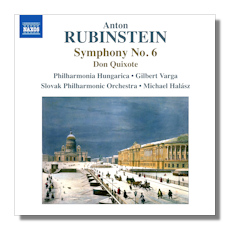
The Internet's Premier Classical Music Source
Related Links
- Rubinstein Reviews
- Latest Reviews
- More Reviews
-
By Composer
-
Collections
DVD & Blu-ray
Books
Concert Reviews
Articles/Interviews
Software
Audio
Search Amazon
Recommended Links
Site News
 CD Review
CD Review
Anton Rubinstein

Reissues
- Symphony #6, in A minor, Op. 111
- Humoresque for Orchestra "Don Quixote", Op. 87 *
Philharmonica Hungarica/Gilbert Varga
* Slovak Philharmonic Orchestra/Michael Halasz
Naxos 8.555394 64m
These performances are reissues that originally appeared in the 1980s on two different Marco Polo CDs. As you might suspect, these works are rarely recorded: this appears to be the only recording of the symphony currently available, though there are two others of Don Quixote. Thus the performances would be acceptable to Rubinstein admirers even if the playing and readings were only so-so. I'm happy to report that is not the case here, as both feature fine interpretations and quite spirited and accurate playing by the respective orchestras. But, you ask, how is the music?
Rubinstein's 6th brims with brightness and exuberance, and while it is often quite light in its expressive manner, it is a fairly epic and muscular work, not a piece of fluff. Coincidentally, it bears the same opus number (111) as the later and very tragic 6th Symphony of Sergei Prokofiev, a work far removed in its darkness and final catastrophe. Rubinstein's music here seems at times to augur Tchaikovsky, look back toward Mendelssohn and Schumann, look over toward Brahms and Dvorak, and even at times to offer hints of Wagner. Not that Rubinstein did not have an individual voice: this symphony, though it contains a Russian sound and spirit, also has a cosmopolitan character and plentiful good tunes recognizable as Rubinstein's own.
I would say the symphony's effervescent third movement is as masterly a creation as anything Rubinstein ever wrote for orchestra. The first movement is dramatic and bright and full of energy. The ensuing movement is playful and whimsical, but with a wistful sense as well. At 13:38, the finale is the longest movement and while effective in Rubinstein's typically lush and brilliant scoring and in his attractive themes, the music seems to overstay its welcome. Still, it's a fine closing panel to an unjustly neglected work. Unjustly neglected indeed: I can't understand why this work doesn't appear at least occasionally in the world's concert halls.
The Don Quixote Humoresque is also an intriguing work – and it does get a tad more attention from conductors and orchestras. It's a colorful piece that evokes Mendelssohn and Schumann again, but even more so here. Yet, despite its subject matter and stylistic traits, it's often quite serious. But it's quite exotic too, and in the end comes across as an episodic piece whose mood swings, deft scoring and attractive melodies yield an effective concert piece.
As mentioned earlier, both performances are fine. The sound reproduction, though dating from the mid-1980s, is quite vivid and powerful. For those interested in Rubinstein and of music from the Romantic school, this CD should be a desirable acquisition.
Copyright © 2014, Robert Cummings





















